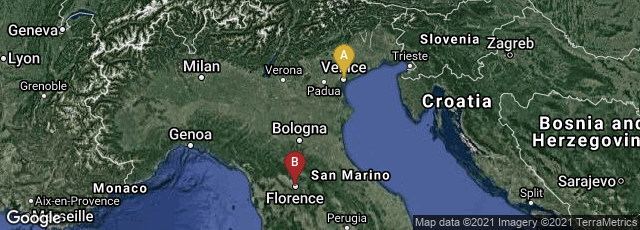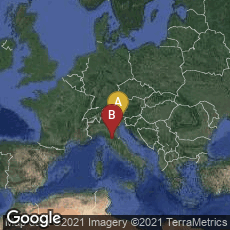

A: Venezia, Veneto, Italy, B: Firenze, Toscana, Italy
Surprisingly, the collected works of Plato, the Opera, was not published in print until quite late in the 15th century, in an undated edition of the translation by humanist and Neoplatonist Marsilio Ficino issued in Florence by Laurentius (Francisci) de Alopa, Venetus (Lorenzo di Franciescho da Vinegia, Lorenzo de Alopa) from 1484-86. (ISTC No. ip00771000.). In July 2014 a digital facsimile of this edition was available from the Bayerische Staatsbibliothek at this link.
The printing of the first edition was done in Florence at the press of the monastery of San Jacopo di Ripoli, the first press known to employ women— in this case nuns from its convent who worked as compositors setting type. Remarkably the Diario of this press survived, recording its day-to-day operation and the production of 100 books from 1476 till the death of its founder Fra Domenico in 1484. This manuscript remains the earliest record from which the day-to-day operation of any fifteenth century press can be reconstructed. It was edited with an introduction by Melissa Conway and published as The Diario of the Printing Press of San Jacopo di Ripoli 1476-1484: Commentary and Transcription (Florence: Leo S. Olschki, 1999). "The Diario documents 37 different print runs that were produced either on commission or as independent commercial ventures, and provides a unique contemporary record of the printing shop’s paper supplies, presswork, expenses, and prices, as well as 294 entries for the consignment of more than 3,500 copies of books and broadsides with local stationers, booksellers, and illuminators" (Eric White, A Census of Print Runs for Fifteenth-Century Books [2012-13], accessed 07-07-2014).
From the Conway edition (p. 17 ff) we learn that on January 25, 1484 the San Jacopo di Ripoli monastery press signed a contract for 1025 copies of Plato's Opera. The edition was funded by Francesco Berlinghieri and Filippo Valori, and was to be printed by Fra Domenico and his chief worker Lorenzo. Printing began on February 8, and by the end of September parts two to five of the five part work were completed. During this period, probably sometime in August, Fra Domenico died, and the responsibility for the project passed to Lorenzo, who had worked his way up from apprentice to to full partnership in the press. Because Lorenzo issued the completed work under his name alone, and he went on to become an important printer of humanistic and Greek texts in Florence, the fundamental role of the monastic press of San Jacopo di Ripoli— the first press to employ women— in this project, is often forgotten.
The first collected edition of Plato's Dialogues was justifiably a bestseller. Copies were also probably very heavily used, as a high percentage of the roughly 100 extant copies are incomplete. On August 13, 1491 a second edition of Ficino's translation was issued in Venice by Bernardinus de Choris, de Cremona and Simon de Luere, for Andreas Torresanus, de Asula. According to the ISTC No. ip00772000, probably even more copies of this edition are preserved than the first edition, and notably fewer copies of the 1491 edition are incomplete. In July 2014 a digital facsimile of the 1491 edition was available from the Bayerische Staatsbibliothek at this link.
The editio princeps of Plato's works in Greek was published by Aldus Manutius of Venice in 1513.